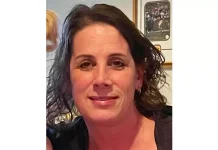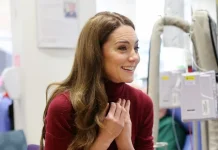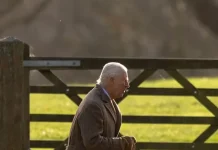Marnie Wills was two months into her dream nursing degree before her world was turned upside down.
The ‘fit and healthy’ student, from Melbourne, was just 19 when she was diagnosed with stage-three cancer in April 2020.
Now 21, Marnie told FEMAIL she had been a dancer her whole life, trained three times a week and felt the healthiest she had ever been.

‘I had itchy skin for years with no sign of a rash and saw different skin specialists who all thought it was dermatitis.
‘Six to eight months prior to the diagnosis, I had been experiencing night sweats but didn’t think anything of it,’ Marnie said.
Little did she know the two ‘vague’ symptoms were signs of tumours growing unnoticed in her chest and abdomen. They were later found to be nodular sclerosing Hodgkin’s lymphoma (NSHL), the most common type of the disease.
At university she required a blood test before a placement, which thankfully led to the diagnosis.
‘Doctors said if I didn’t have a blood test when I did, there would’ve been a chance that within 12 months I would be gone,’ she said.
Two days after having the blood test, the GP called Marnie to say the results were ‘unusual’ and she was sent to the emergency department.

‘They thought I was having a heart attack based off the results. Then they did a chest X-ray and a heart scan, and I lit up like a Christmas tree.
‘The scans detected small tumours across Marnie’s body, particularly in her chest and abdomen.
At that point, doctors weren’t sure if any were cancerous or not, so she was sent to a surgeon for a biopsy at the Olivia Newton-John Cancer Centre.
The results later confirmed she had Hodgkin’s lymphoma.
‘It was just luck that I was diagnosed because we never really thought anything of my symptoms. I should’ve gone to the doctor sooner but being so young I never thought it would be anything serious,’ she said.
Because it was a known type of the disease, doctors reassured Marnie it was treatable.
However, being stage three, the cancer was serious and if left any longer it possibly would have grown elsewhere in the body.
Surprisingly, despite where the tumours were, Marnie didn’t experience any pain.
She also has no family history of cancer and says her case was just a matter of ‘bad luck’ as the cause is unknown.
‘I had finished school and just started uni then it all went downhill pretty fast. I hadn’t heard of the type of cancer before either,’ Marnie said.
‘As soon as I heard the word “cancer” my brain switched off. Everything went in one ear and out the other. I went into a frozen-like state. I didn’t know how to feel or what to think.’
In a swift turnaround, Marnie started treatment within three days and had her first round of chemotherapy on a Thursday.
‘I was definitely the youngest person in the chemo ward. Everyone else looked over 65. It was so strange being there and I never saw another young person come in,’ she said.
She required treatment for nine months and during the process she lost her hair, got shingles from an infection, had mouth ulcers that became so bad she couldn’t drink water. She also felt nauseous all the time.
Surgeons couldn’t physically remove the large tumour in her chest because it was too close in proximity to her heart and lungs.
Thankfully, the treatment worked exceptionally well at decreasing the tumours, and now she only has one remaining.
After she received the life-changing news, she first deferred from her nursing degree then dropped out.
Today, Marnie works in administration and doesn’t plan to return to her studies because she doesn’t want to work in a hospital.
Marnie said the hardest aspect of the whole experience was watching her friends go on with their lives while she remained in hospital for months.
‘Scrolling through social media and seeing others living normal lives… I guess you just have to try hard not to compare,’ she said.
‘It was hard seeing how much it was impacting my family, too. I’m very close with my immediate family. It was Covid times, so I wasn’t allowed any visitors in the hospital and couldn’t bring anyone along.’
From this she found an unknown inner strength she didn’t know she had, and made it through the terrifying ordeal with a positive mindset.
‘It all happened so fast that it didn’t actually sink in until after I finished treatment,’ she said, adding: ‘I think I went into fight-or-flight mode and did what I had to do. Plus, I had to be strong for everyone else.
‘With every treatment I thought I’m one step closer to the finish line.
‘Now she has a newfound appreciation for life and doesn’t take anything for granted. She also has annual check-ups to ensure the cancer doesn’t return.












